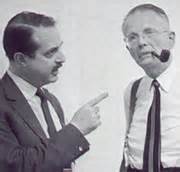A Quote by Walter Lippmann
Ideals are an imaginative understanding of that which is desirable in that which is possible.
Quote Topics
Related Quotes
Ideals are very often formed in the effort to escape from the hard task of dealing with facts, which is the function of science and art. There is no process by which to reach an ideal. There are no tests by which to verify it. It is therefore impossible to frame a proposition about an ideal which can be proved or disproved. It follows that the use of ideals is to be strictly limited to proper cases, and that the attempt to use ideals in social discussion does not deserve serious consideration.
Not to Learn Irish is to miss the opportunity of understanding what life in this country has meant and could mean in a better future. It is to cut oneself off from ways of being at home. If we regard self-understanding, mutual understanding, imaginative enhancement, cultural diversity and a tolerant political atmosphereas a desirable attainments, we should remember that a knowledge of the Irish language is an essential element in their realisation.
Everyone will be compelled to see that which is optically true, is explicable in its own terms, is objective, before he can arrive at any possible subjective position. This will abolish that pictorial and imaginative association pattern which has remained unsuperseded for centuries and which has been stamped upon our vision by great individual painters.
Is it possible that there is something we don't fully understand about God and about Life, the understanding of which would change everything? Is it possible that there is something we don't understand about ourselves, and about who we are, the understanding of which would alter our lives forever for the better? Yes. The answer is yes.
Governments do not make ideals, but ideals make governments. This is both historically and logically true. Of course the government can help to sustain ideals and can create institutions through which they can be the better observed, but their source by their very nature is in the people. The people have to bear their own responsibilities. There is no method by which that burden can be shifted to the government. It is not the enactment, but the observance of laws, that creates the character of a nation.
Correct is to recognize what diseases are and whence they come; which are long and which are short; which are mortal and which are not; which are in the process of changing into others; which are increasing and which are diminishing; which are major and which are minor; to treat the diseases that can be treated, but to recognize the ones that cannot be, and to know why they cannot be; by treating patients with the former, to give them the benefit of treatment as far as it is possible.
Now with the allocation and the understanding of the lack of understanding, we enter into a new era of science in which we feel nothing more than so much so as to say that those within themselves, comporary or non-comporary, will figuratively figure into the folding of our non-understanding and our partial understanding to the networks of which we all draw our source and conclusions from.
The fate of an epoch that has eaten of the tree of knowledge is that it must...recognize that general views of life and the universe can never be the products of increasing empirical knowledge, and that the highest ideals, which move us most forcefully, are always formed only in the struggle with other ideals which are just as sacred to others as ours are to us.

































